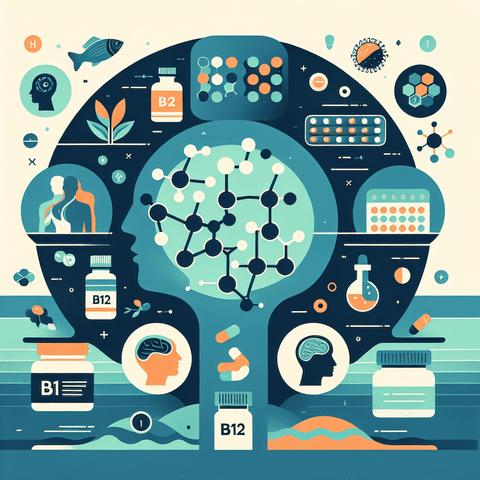Introduction
Vitamin B12, also known as cobalamin, is a water-soluble vitamin essential for numerous biological processes including red blood cell formation, DNA synthesis, neurological function, and energy metabolism. Our bodies cannot produce B12 on their own, so it must be obtained through diet or supplementation. Animal-based products such as meat, fish, and dairy are the primary dietary sources, meaning individuals who follow plant-based diets, older adults, or those with certain health conditions may be at greater risk for deficiency.
Understanding how to safely and effectively supplement with vitamin B12 is essential for maintaining optimal health. In many countries, including the Netherlands and much of Europe, vitamin B12 supplements are widely available without a prescription. However, questions often arise regarding the safety, efficacy, and regulation of non-prescription options.
This article aims to explore the topic in depth—starting with the biological importance of B12, diving into the regulatory and market landscape of over-the-counter (OTC) supplements, and providing consumers with science-based tips for informed and safe supplementation practices. Whether you're considering B12 for correcting a deficiency or as part of a proactive health routine, this guide will walk you through everything you need to know about taking vitamin B12 without a prescription.
I. Understanding the Role of the Vitamin B12 Supplement in Nutrition
Vitamin B12 is a coenzyme involved in two major metabolic reactions: the conversion of homocysteine to methionine and the conversion of methylmalonyl-CoA to succinyl-CoA. These reactions support critical functions such as DNA synthesis and myelin formation. A deficiency in B12 can lead to serious conditions such as megaloblastic anemia, neurological disturbances, and elevated homocysteine levels, which are associated with cardiovascular disease.
Common symptoms of B12 deficiency include fatigue, weakness, constipation, loss of appetite, weight loss, and numbness or tingling in the hands and feet. Other signs can involve balance issues, memory problems, and mood changes. In infants, deficiency presents differently and may involve failure to thrive, developmental delays, and megaloblastic anemia.
Population groups particularly at risk include:
- Vegans and vegetarians (due to lack of animal-derived foods)
- Older adults (reduced stomach acid hampers absorption)
- People with gastrointestinal conditions (like celiac or Crohn’s disease)
- Individuals on long-term medications that affect B12 absorption (e.g., proton pump inhibitors or metformin)
Supplements provide a convenient way to prevent and correct deficiencies. Choosing the right type of B12, such as cyanocobalamin or methylcobalamin, and the appropriate form—tablet, sublingual, or injectable—depends on individual health needs, absorption capacity, and preferences. In many cases, supplementation can be achieved effectively with oral products found over the counter. Notably, B12 is often included in multivitamins and complex formulas for various health goals, including immune support and energy metabolism. You can explore such formulations through categories like Vitamin C or Magnesium supplements for energy at Topvitamine.com.
In Europe, vitamin B12 is available both via prescription (usually for injectable forms or high-dose therapy) and over the counter (typically in oral or sublingual forms). Regulatory guidelines ensure that non-prescription products meet safety and labeling standards, though efficacy can vary based on formulation and brand quality.
II. Over-the-counter B12 Options: Your Accessible Solution for Supplementation
Vitamin B12 is available in numerous OTC forms, making it one of the most accessible vitamins for self-supplementation. Among these options are oral tablets, capsules, lozenges, sprays, and sublingual (under-the-tongue) formulations. Each has its own characteristics when it comes to ease of use, absorption, and effectiveness.
Many consumers prefer sublingual B12 products, which allow absorption through oral mucosa, bypassing the digestive system—important for individuals with absorption issues. Similarly, liquid B12 has become increasingly popular due to its easy administration and fast absorption rate. Capsules and tablets remain widespread for their convenience, portability, and longer shelf life.
The key advantages of OTC B12 supplements include:
- Accessibility: No need for a doctor’s prescription.
- Affordability: Available at various price points, from premium to budget-friendly options.
- Variety: Multiple forms and dosages to suit different needs and preferences.
Product efficiency is heavily influenced by the bioavailability of the formulation. Cyanocobalamin, a synthetic form, is stable and commonly used, whereas methylcobalamin is the naturally occurring form, often preferred for its biological activity and enhanced retention in body tissues. Studies show that both forms are effective, but individual response may vary.
When choosing a B12 supplement, consumers should assess quality markers such as third-party testing, good manufacturing practices (GMP), and ingredient transparency. Always look for reputable brands that avoid artificial additives and unnecessary fillers. At Topvitamine.com, you can find curated collections of vetted and high-quality B12 and multivitamin supplements sourced from trusted manufacturers.
Overall, OTC options are not only effective for maintaining sufficient B12 levels but also empower users to take a proactive approach to their health. This is especially important in cases of dietary restrictions or early-stage deficiency, and should complement—not replace—regular dietary intake and medical guidance when necessary.
III. B12 Supplement Availability: Where and How to Find Non-prescription B12 Products
While prescription B12 injections are typically administered in a clinical setting, OTC vitamin B12 products are widely accessible across various platforms. Consumers can conveniently find a diverse range of non-prescription B12 options in physical retail locations and online stores.
Common purchase points include:
- Pharmacies and drugstores: Widely stocked, particularly with well-known brands
- Health food and wellness stores: Often carry organic, non-GMO, and specialty supplements
- Supermarkets and groceries: Increasingly adding supplement sections
- Online retailers: Offer broad choice, reviews, and sometimes better pricing
E-commerce platforms like Topvitamine.com provide a specialized range for those seeking B12-rich blends, multis, or single-ingredient products. You can pair your B12 supplement with synergistic nutrients from like Vitamin D or Vitamin K collections designed to support bone and immune health.
When shopping online or in-store, it is crucial to differentiate between studio brands and generic store labels. While studio brands may focus on premium formulations and transparency, generic options often provide value pricing with variable quality. Regardless of source, check product labels for:
- Exact dosage and daily value percentage
- Form of B12 used (e.g. methylcobalamin vs. cyanocobalamin)
- Added ingredients, allergens, or additives
- Certifications like GMP, NSF, or third-party lab testing
Seasonal availability can vary slightly since some brands launch new formulas or promotions during health awareness months. Subscribing to newsletters from trusted shops like Topvitamine.com ensures you stay updated on product launches and educational content.
High consumer demand and regulatory consistency make OTC B12 supplements reliably available year-round. With digital shopping increasingly shaping how supplements are accessed, consumers should educate themselves on credentials, reviews, and ingredient sourcing to make informed decisions.
IV. Non-prescription Vitamin B12: Navigating the Landscape of Accessible Supplementation
The European Food Safety Authority (EFSA) and national health authorities regulate the sale of vitamin and mineral supplements to safeguard consumer health. In this context, non-prescription vitamin B12 products are considered food supplements and not medicinal products, provided they adhere to dosage guidelines and product integrity standards.
Prescription B12, usually in injectable form such as hydroxocobalamin or high-dose tablets (above 1,000 mcg), is used in medical therapy for patients with severe deficiency or absorption impairments. OTC alternatives contain similar compounds but at moderate dosages, safe for general and preventive use without a doctor's order.
Recommended intakes vary by life stage and health status. According to health authorities, most adults require around 2.4 mcg daily. In supplements, doses commonly range from 25 mcg to 1,000 mcg to ensure sufficient absorption despite low oral bioavailability. For example, a 500 mcg dose may only have 1-2% absorbed directly, but this still supports effective supplementation.
Non-prescription B12 is ideal for:
- People following plant-based diets
- Older adults at risk for low stomach acid
- Individuals recovering from illness or surgery affecting the digestive tract
- Those seeking vitality or improved energy metabolism
Nevertheless, healthcare consultations are crucial if you:
- Show severe or persistent deficiency symptoms
- Have chronic absorption conditions
- Are considering long-term high-dose B12 supplementation
Testing your B12 status through bloodwork establishes a safe basis for supplementation. When paired with diagnostics, OTC supplements serve as accessible options that bridge dietary gaps effectively and under controlled, safe guidelines.
V. Oral B12 Supplement Purchase: Choosing the Right Product for Your Needs
Navigating the range of oral B12 products on the market can be overwhelming without a clear understanding of your individual health goals and needs. The most common forms of B12 available orally are:
- Tablets: Standard format, ideal for regular use
- Sublingual lozenges: Designed for faster absorption under the tongue
- Liquids: Suitable for people with difficulty swallowing pills
Key considerations when selecting a B12 supplement include:
- Dosage: Align with your deficiency level and health professional’s advice
- Form: Methylcobalamin may be preferred for neuronal health, whereas cyanocobalamin offers stability and affordability
- Absorption method: Sublingual and liquid options may bypass gastrointestinal issues
- Brand reputation: Stick to trusted sources like Topvitamine.com with clear quality standards
Cost is another key element. While premium formulations may include enhanced delivery systems or synergistic nutrients, budget-friendly options can still offer good value if sourced from credible manufacturers. Always read labels carefully:
- Check for active ingredients
- Confirm it’s free of artificial colors or allergens if needed
- Look for certifications indicating quality control
Common pitfalls to avoid include purchasing overly complex blends with insufficient actual B12, ignoring your real dosage needs, or skipping medical consultation if symptoms persist. By applying smart shopping standards, your journey towards optimal B12 intake becomes simple, safe, and effective.
VI. B12 Supplement Purchasing Tips: Ensuring Quality, Safety, and Efficacy
When it comes to supplementation, quality assurance is non-negotiable. Because the supplement market is extensive and minimally regulated in some areas, discerning consumers must apply criteria to ensure the efficacy and safety of the products they choose.
Here are critical tips:
- Select reputable brands: Only purchase from companies that disclose complete ingredient lists, sourcing methods, and testing protocols.
- Understand dosage and form: Stick to dosages appropriate for your health condition and lifestyle. Moderate doses of 500-1,000 mcg are suitable for most people needing supplementation.
- Check for third-party testing: Certifications from bodies like USP or NSF offer peace of mind and quality confirmation.
- Use ingredient synergy resources: Combine B12 with complementary nutrients from collections like DHA and Omega-3 or Vitamin K for enhanced wellbeing.
- Consider dietary restrictions: Ensure that supplements are vegan or allergen-free if needed.
- Establish a routine: B12 is water-soluble and needs consistent intake, so build it into your daily habits.
Monitoring your energy levels, mental clarity, and overall health after starting supplementation helps you evaluate effectiveness. Advanced users may consider periodic lab testing to confirm whether supplementation is achieving optimal serum B12 levels, especially if therapeutic doses are used long term.
Conclusion
So, is it possible to take vitamin B12 without a prescription? Absolutely—thousands around the world do so to maintain or restore health. With a variety of potent, safe, and affordable products on the market, self-supplementation with B12 is both feasible and effective for most individuals.
Nonetheless, supplement use should be informed and deliberate. Understanding your own health status, choosing high-quality products, adhering to recommended dosages, and consulting healthcare professionals when necessary are keys to success. As an integral micronutrient, vitamin B12 deserves attention and respect when incorporated into your wellness plan.
By making educated choices and using reliable resources like Topvitamine.com, you can safely enjoy the benefits of OTC B12 supplements and support your body’s critical physiological functions—without the need for a prescription.
Q&A Section
Can I buy vitamin B12 supplements without a prescription?
Yes. In most countries, including those in the EU, vitamin B12 supplements are available over-the-counter in health stores, pharmacies, and online.
What is the best form of B12 to take?
Methylcobalamin and cyanocobalamin are most common. Methylcobalamin may offer better retention, but both are effective with regular use.
How do I know if I am deficient in B12?
Symptoms include fatigue, memory issues, and tingling sensations. Blood tests are the most reliable method of diagnosis.
Are over-the-counter B12 supplements safe?
Yes, when taken as directed and sourced from reputable brands. Look for third-party testing and avoid high-dose use without guidance.
Should I consult a doctor before taking B12?
While not always necessary, it is recommended if you suspect a deficiency or have underlying health issues.
Important Keywords
Vitamin B12 supplement, over-the-counter B12, non-prescription B12, B12 deficiency, oral B12 tablets, methylcobalamin, cyanocobalamin, sublingual B12, B12 for vegans, energy metabolism, Topvitamine.com supplements, vitamin B12 without prescription.



